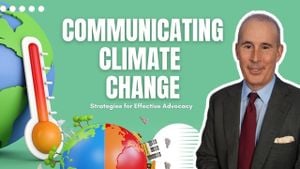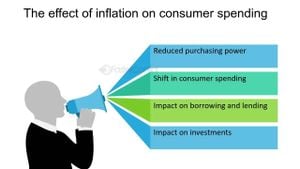Former presidential candidate Robert F. Kennedy Jr. has been tapped by President-elect Donald Trump to lead the Department of Health and Human Services (HHS), stirring considerable debate among public health experts. This nomination not only marks a pivotal shift within the administration but also sets the stage for potential conflict over Kennedy's outspoken views on vaccines and public health policies.
Trump announced the appointment on his social media platform, Truth Social, expressing his enthusiasm and emphasizing the need for reform within the U.S. health system. "I am thrilled to announce Robert F. Kennedy Jr. as The United States Secretary of Health and Human Services (HHS)," Trump wrote, pointing to the detrimental influence of the pharmaceutical and industrial food industries on public health. "For too long, Americans have been crushed by the industrial food complex and drug companies who have engaged in deception, misinformation, and disinformation when it operates on important issues of health and safety. The safety and health of all Americans is the most important role of any administration, and HHS will play a key role in protecting citizens from harmful chemicals and pollutants."
The choice of Kennedy, who has long been associated with anti-vaccine sentiments and questionable health claims, has raised eyebrows within both political parties. While some Republicans have backed his nomination, many Democrats and public health officials have expressed alarm over the potential consequences of placing Kennedy, known for his controversial views, at the helm of one of the country's most significant health agencies.
Kennedy, the son of former U.S. Attorney General Robert F. Kennedy and nephew of President John F. Kennedy, has gained notoriety for his active criticism of childhood vaccinations, even claiming links between vaccines and autism—a notion widely debunked by scientific research over decades. His outspoken skepticism toward public health directives during his campaign has positioned him as both a champion for some and a source of concern for others.
Reflecting on the breadth of responsibility awaiting him at HHS, Kennedy stated, "We have a generational opportunity to bring together the greatest minds in science, medicine, industry, and government to put an end to the chronic disease epidemic." Once focused heavily on childhood vaccinations, his rhetoric has recently shifted toward broader public health discussions, which could encompass subjects like nutrition and chronic diseases.
Despite Trump’s optimistic remarks about Kennedy’s qualifications, the nomination is seen as contentious. Democratic opposition looms large, with influential Senate leaders already voicing skepticism. Senator Ron Wyden of Oregon cautioned, "Trump’s health agenda isn’t a secret: worse health care at higher costs for American families. Kennedy's outlandish views on basic scientific facts are disturbing and should worry all parents..." Meanwhile, some Republicans have also noted their hesitance, including Senator Susan Collins of Maine, who remarked, "I find some of his statements to be alarming, but I’ve never even met with him or sat down with him. That said, I think it would be surprising if he were confirmed."
The prospect of Kennedy's confirmation remains uncertain, as he will require Republican support to secure his position. Although Trump's influence among GOP senators may provide Kennedy with some backing, hesitance among centrists and vocal opposition from Democrats could significantly complicate his path. Republican Senator John Cornyn remarked pragmatically about the process, saying, "I don’t have any preconceived notions about it. I think we just ought to be open to doing our job."
Public health analysts have noted the potential for disruption within HHS should Kennedy's views take root at the agency. Dr. Richard Besser, former acting director of the Centers for Disease Control and Prevention (CDC), highlighted the looming danger, stating, "The idea of putting someone like Robert F. Kennedy Jr., someone who has significantly contributed to misinformation about vaccines, at the head of HHS poses incredible risks to the health of the nation." His comments echo concerns over maintaining the integrity of public health guidelines, which could be directly influenced by Kennedy’s unorthodox theories.
With Kennedy's nomination on the table, discussions among health experts have shifted to anticipate potential changes to HHS and its agencies. The department oversees various key health initiatives and organizations, including the CDC, the Food and Drug Administration (FDA), and the National Institutes of Health (NIH). Any alterations to how these agencies operate could have far-reaching ramifications for public health policy, funding for vaccine programs, and dissemination of health information.
His appointment signals changes within the agency—especially concerning contentious topics like vaccine policy, which he has historically criticized vehemently. Amid rising vaccination rates and mounting evidence supporting their efficacy, public health advocates fear Kennedy's influence could jeopardize gains made against diseases once deemed under control.
Citing his past controversies, Kennedy's proposed reforms could shatter the status quo. He threatened to eliminate certain departments within the FDA and has discussed the necessity of getting rid of perceived corporate influences on health policies. His statements accusing regulatory bodies of being “industry puppets” could resonate with those skeptical of government health agencies.
Despite the controversies, some see Kennedy's appointment as a chance for dialogue around nutrition and health. Advocates for health reform often point out the discrepancies between dietary habits and chronic disease prevalence across the U.S., and Kennedy has framed these issues as central to his objectives. His aim to shift focus toward nutrition and health risks associated with ultra-processed foods could open the door for bipartisan discussions and cooperative efforts to address these trends.
Interestingly, Kennedy has found support from some unexpected quarters, including Democratic Colorado Governor Jared Polis. Polis praised Kennedy for his efforts to oppose vaccine mandates, reflecting the fissures within party lines on health issues. This somewhat paradoxical alliance hints at possible avenues for cooperation, should Kennedy’s confirmation move forward.
Trump’s cabinet is taking shape quickly, with Kennedy falling among several controversial appointments, including figures like former Representative Matt Gaetz as attorney general. This rapid-fire method of appointing high-profile individuals has sparked unease among even the president’s loyal allies, leading to speculation about the stability and cohesiveness of the incoming administration.
Political observers now face the task of monitoring how Kennedy's nomination and potential confirmation affect broader dialogues about public health. Should he fulfill his promise to reform areas within the HHS and reshape public health initiatives, discussions could explore innovative approaches to chronic illness, nutrition, and health care accessibility. Yet, should his appointment be blocked or met with resistance, it might lead to intensified scrutiny of Trump's health policies moving forward.
Looking toward the Senate confirmation process, the outcome remains to be seen. With Republican support likely necessary to offset Democratic objections, Kennedy's confirmation will be the litmus test of Trump's health policy direction as he leads the nation through the next chapter of American health policy. The debate surrounding his nomination is emblematic of the broader schisms and dilemmas shaping public perceptions around health and wellness.



